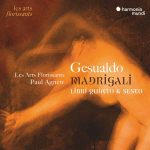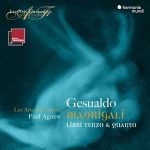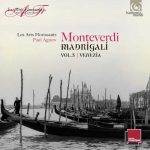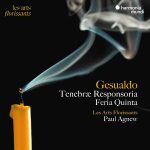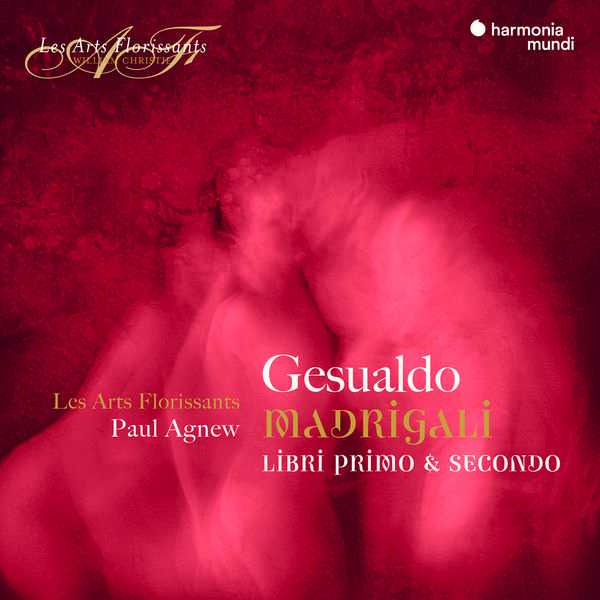

Composer: Carlo Gesualdo
Performer: Les Arts Florissants
Conductor: Paul Agnew
Format: FLAC (tracks)
Label: Harmonia Mundi
Catalogue: HAF890530708
Release: 2019
Size: 797 MB
Recovery: +3%
Scan: yes
CD 01
Libro I
Baci soavi, e cari
01. I. Baci soavi, e cari
02. II. Quant’ha di dolce Amore
03. Madonna, io ben vorrei
04. Com’esser può ch’io viva se m’uccidi
05. Gelo ha Madonna il seno
Mentre Madonna il lasso fianco posa
06. I. Mentre Madonna il lasso fianco posa
07. II. Ahi, troppo saggia nell’errar ; felice
Se da sì nobil mano
08. I. Se da sì nobil mano
09. II. Amor, pace non chero
10. Sì gioioso mi fanno i dolor miei
11. O dolce mio martire
Tirsi morir volea
12. I. Tirsi morir volea
13. II. Frenò Tirsi ‘l desio
14. Mentre, mia stella, miri
15. Non mirar, non mirare
16. Questi leggiadri odorosetti fiori
Felice primavera
17. I. Felice primavera
18. II. Danzan le ninfe honeste, e i pastorelli
19. Son sì belle le rose
20. Bella Angioletta da le vaghe piume
CD 02
Libro II
Caro amoroso neo
01. I. Caro amoroso neo
02. II. Ma se tale ha costei
03. Hai rotto, e sciolto, e spento a poco a poco
Se per lieve ferita
04. I. Se per lieve ferita
05. II. Che sentir deve il petto mio che langue
06. In più leggiadro velo
Se così dolce è il duolo
07. I. Se così dolce è il duolo
08. II. Ma s’avverrà ch’io moia
09. Se taccio, il duol s’avanza
O come è gran martire
10. I. O come è gran martire
11. II. O mio soave ardore
12. Sento che nel partire
Non è questa la mano
13. I. Non è questa la mano
14. II. Né tien face, o saetta
15. Candida man, qual neve, a gl’occhi offerse
Dalle odorate spoglie
16. I. Dalle odorate spoglie
17. II. E quell’arpa felice
18. Non mai, non cangerò
19. All’apparir di quelle luci ardenti
20. Non mi toglia il ben moi
Having thoroughly explored the madrigals of Monteverdi, Paul Agnew returns to the genre, this time focusing on the work of Gesualdo, whose mastery of chromaticism and dissonance eventually turned these expressive devices into a defining feature of his musical style.
A fascinating repertoire that Paul Agnew and his team delight in offering here.
Much gossip has surrounded the double murder committed by Carlo Gesualdo, who killed his young wife and her lover when he caught them in flagrante delicto. The remorse he felt for this atrocious crime is said to have inspired the Neapolitan composer to write new harmonies, using and abusing scraping and characterful chromatisms. Paul Agnew takes aim at this widespread belief, contending that “this aristocratic double murder only indirectly influenced the musician’s life.” In a very interesting introductory text, the “Associate Musical Director” of the Arts Florissants sets the figure of Gesualdo back into his historical context, explaining just how his tormented psychological state would have fed into his own musical evolution, alongside the musical journeys of his peers. The same line of argument is also made by musicologist Denis Morrier in his analysis of the two first Books of Madrigals, which are presented here: “At once visionary and conservative, eccentric in language and conventional in form, these works have fascinated musicians and commentators across the ages”, he writes.
Following the recording of 17 madrigals from Book IV to Book VI, conducted by William Christie in 1988, this new album marks the first stage of a complete recording of Gesualdo’s Madrigals, which are to be performed across three seasons at the Philharmonie de Paris. Passionate, violent, dark and burning with meaning, Gesualdo’s music touches the heart and speaks to us of the doubts and contradictions of the human soul.
